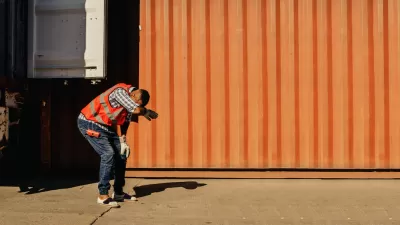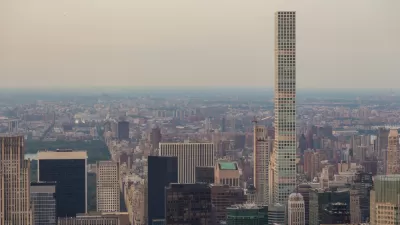This summer's heat waves wreaked havoc on physical infrastructure, but also highlighted vulnerabilities in our social support systems.

"In an era of escalating climate change," asserts Sarah Kaplan, "extreme heat is the United States’ most fatal form of weather disaster. Already this summer, hundreds of Americans have lost their lives amid a series of record-setting heat waves that scientists say would not have happened if not for human-caused warming." In Oregon and across the Pacific Northwest, "[r]oads have buckled, and train cables have melted. Emergency departments were overwhelmed."
In addition to physical infrastructure, officials "are realizing their social infrastructure is equally in need of repair. Long-standing inequities in housing and health care put the region’s poorest residents at greatest risk. Official warnings and government services didn’t reach those who most needed the help. Almost every victim of the heat wave died alone," Kaplan writes.
"When the heat dome scorched the state last month, Oregon did not have a heat early warning and response system, the gold standard for disaster planning. Residents in the typically temperate region didn’t know how to cope with extreme temperatures" and many didn't receive information about how to protect themselves.
"The most effective strategy for preventing heat deaths is direct outreach, experts say. After a brutal nine-day heat wave killed 118 people in Philadelphia in 1993, the city implemented one of the nation’s most robust heat response programs." Later, "[a] study by a team of Boston researchers found that the Philadelphia system averted an average of 45 deaths per year."
According to Gabriela Goldfarb, manager of the Oregon Health Authority (OHA)'s environmental public health section, "[p]reventing deaths during climate disasters is not just about emergency response, but rather "about building 'social resilience,' addressing the isolation and inequality that make people vulnerable in the first place" by reducing the effects of urban heat islands, expanding access to health care, and funding better outreach for marginalized communities.
FULL STORY: Heat waves are dangerous. Isolation and inequality make them deadly.

Alabama: Trump Terminates Settlements for Black Communities Harmed By Raw Sewage
Trump deemed the landmark civil rights agreement “illegal DEI and environmental justice policy.”

Planetizen Federal Action Tracker
A weekly monitor of how Trump’s orders and actions are impacting planners and planning in America.

The 120 Year Old Tiny Home Villages That Sheltered San Francisco’s Earthquake Refugees
More than a century ago, San Francisco mobilized to house thousands of residents displaced by the 1906 earthquake. Could their strategy offer a model for the present?

LA’s Tree Emergency Goes Beyond Vandalism
After a vandal destroyed dozens of downtown LA trees, Mayor Karen Bass vowed to replace them. Days later, she slashed the city’s tree budget.

Sacramento Leads Nation With Bus-Mounted Bike Lane Enforcement Cameras
The city is the first to use its bus-mounted traffic enforcement system to cite drivers who park or drive in bike lanes.

Seattle Voters Approve Social Housing Referendum
Voters approved a corporate tax to fund the city’s housing authority despite an opposition campaign funded by Amazon and Microsoft.
Urban Design for Planners 1: Software Tools
This six-course series explores essential urban design concepts using open source software and equips planners with the tools they need to participate fully in the urban design process.
Planning for Universal Design
Learn the tools for implementing Universal Design in planning regulations.
Ada County Highway District
Clanton & Associates, Inc.
Jessamine County Fiscal Court
Institute for Housing and Urban Development Studies (IHS)
City of Grandview
Harvard GSD Executive Education
Toledo-Lucas County Plan Commissions
Salt Lake City
NYU Wagner Graduate School of Public Service





























